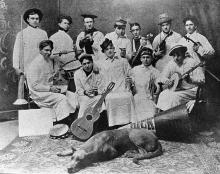- Home
- Archival Material
- College History Projects
- Subject-Based Digital Projects
The Sophomore Band

During the early twentieth century, hazing became a prominent issue on American college campuses. At Dickinson College in Carlisle, Pennsylvania, hazing seemed to develop in response to class rivalries, especially between the freshman and sophomore classes. Tensions increased with contests such as the annual "cap scrap" between freshmen and sophomores and the Yellow Button basketball game. On the College campus, hazing was concentrated for a time among a highly secret group called The Sophomore Band.
The Sophomore Band was founded on December 8, 1899 by twelve members of the Class of 1902. The charter members agreed upon the creed to "Raise the Devil and shun Dockie," as students at the time referred to President George Reed as "Dockie." The main purpose of the Sophomore Band was to terrorize the community as a whole, but freshmen in particular. The Band staged nightly riots, destroyed electric lamps on campus, and made clandestine attacks on other students and College buildings.
In 1907, rules and regulations for the conduct of the members of the freshman class were put into place. These rules denied freshmen the right to carry canes, smoke on campus, wear the Preparatory School insignia, and wear mustaches or sideburns. The Sophomore Band placed itself in charge of enforcing these laws and those freshmen who did not follow them were tormented greatly. Also in 1907, the Sophomore Band started its own publication, The Onion. In this publication, members reported on freshmen who were not abiding by the underclassmen rules and included gossip and slander.
Eventually, hazing by sophomores declined on Dickinson's campus. The conflicts among different classes and between students and faculty were signs that students needed some form of regulation and self government. With the help of faculty the students formed the Student Assembly in 1908, to keep order on campus. The freshmen rules and the resultant conflicts and "scraps" would remain a part of campus tradition for decades more, although the Sophomore Band faded from its infamous place of prominence. The last issue of the Onion was published in 1911.
Date of Post:
2005
Organization Type: